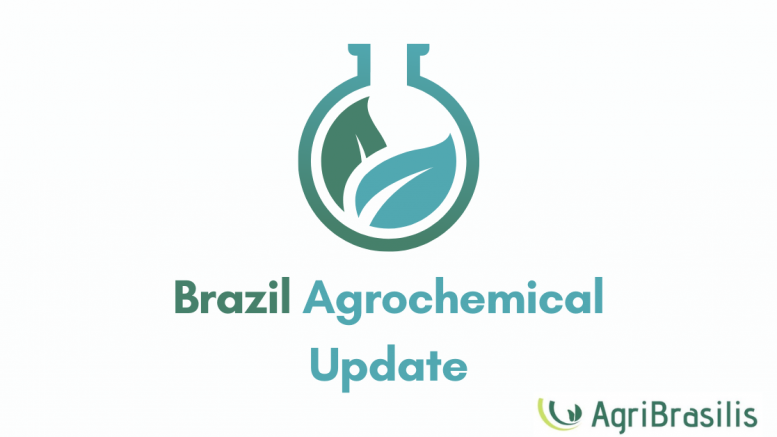News on Brazilian Fertilizer Market
- Ministry of Agriculture approves 50 pesticide registrations. Among the products, 21 are recommended for soybean, 13 have recommendations for corn and 11 for cotton. A list of pesticide registration requests was published, with 56 requests. Most of them are herbicides. (MAPA)
- Epagri and Pamplona develop fertilizer made from meat processing industry waste. The project is being developed at the Epagri Experimental Station in Itajaí, state of Santa Catarina, at the Lauro Pamplona composting unit. Almost 400 tonnes of waste products are being treated monthly. The product’s characteristics allowed its registration with MAPA as a Class A fertilizer, which allows wide use, including in organic crops. (Santa Catarina Agricultural Research and Rural Extension Company)
- Cibra Fertilizantes forecasts revenue of US$ 1.5 billion in 2022, compared to US$ 990 million in the previous year. Estimated production is 2.3 million tonnes. By 2026, the company’s goal is to reach 5 million tonnes, which should involve investments of more than US$ 197 million in at least two new factories. “The plan is to build from scratch at least more than one factory, larger than the ones we are building now, and fill 100% of the national territory”, says the CEO of Cibra, Santiago Franco. (Cibra Fertilizers)
- Imports of fertilizers between January and July 2022 increased by 15.5% compared to the previous year, totaling 23 million tonnes. Phosphates had the biggest increase in the period, with 33.17%, or 8.65 million tonnes. Nitrogen fertilizers showed a reduction of 4.35%. (Secretariat of Foreign Trade; National Association for the Diffusion of Fertilizers)
- Research from the Federal University of São Carlos indicates that nanoparticles of silicon, zinc, titanium and gold can help in the growth of rhizobacteria, facilitating the uptake of nutrients by plants. Nanobiofertilizers can reduce the cost of food production and have been identified as an alternative to reduce environmental degradation. (UFSCar)
- Raul Jungmann, former Minister of Defense, says that fertilizers are a national security matter and that Brazilian agribusiness showed a hidden weakness during the Russian-Ukraine war, given its dependence on imported fertilizer. Declaration was made during the 9th Brazilian Congress of Fertilizers. Also in the event, was the Minister of Agriculture, Marcos Montes, who once again defended the international fertilizer trade without restrictions or sanctions due to international conflicts. (National Fertilizer Diffusion Association)
- Federal Court of the State of Paraná convicts six people for importing illegal pesticides. Penalties exceed 36 years in prison. The material arrived in Brazil through the Itaipu lake, in ships that used clandestine ports in western Paraná. (Federal Court of the State of Paraná)
- Seizures of illegal pesticides in 2022 are expected to double the volume in 2020, as the government intensifies inspections. It is estimated a record seizure of 500 tonnes of illegal pesticides. The most seized substance is the herbicide paraquat. (Ministry of Agriculture)
- Croplife criticizes a report about the presence of pesticide residues in ultra-processed foods, claiming that the issue is foreseen and regulated by Anvisa. (Croplife)
- BASF has filed the highest number of patent applications in sustainable agriculture in the last 10 years, with 272 applications. (National Institute of Industrial Property)
- Sheilla Albuquerque will be the CEO of AgroGalaxy, succeeding Welles Pascoal, who will join the company’s board of directors. Transition process will begin on September 1. (AgroGalaxy)
- Researchers at the IAC and the University of Maryland Eastern Shore conduct research on contamination of personal protective equipment, PPE, used during pesticide spraying. The objective is to evaluate the degree of safety of cotton and polyester-based garments. (Instituto Agronômico de Campinas)
- Itaú BBA finances the first rural credit notes issued by resellers of agricultural inputs. Amount allocated was US$ 11 million. (Itau BBA)
- Pesticide market grew 20% in the first half of 2022, moving almost US$ 6.56 billion. Area treated with pesticides increased by almost two million hectares, reaching 740 million hectares. (National Union of Plant Defense Products Industry)
- Soybeans effective operating cost in the State of Mato Grosso shows an increase of 53.91% compared to the previous season of 2021/22. The main item of the cost increase are fertilizers and soil correctrives, which increased by 113.28% in the period. (Mato Grosso Institute of Agricultural Economics)
- Orizon plans to start operations in the next quarter of a industrial site to transform organic waste into organomineral fertilizers. (Orizon)
![]()
READ MORE:

